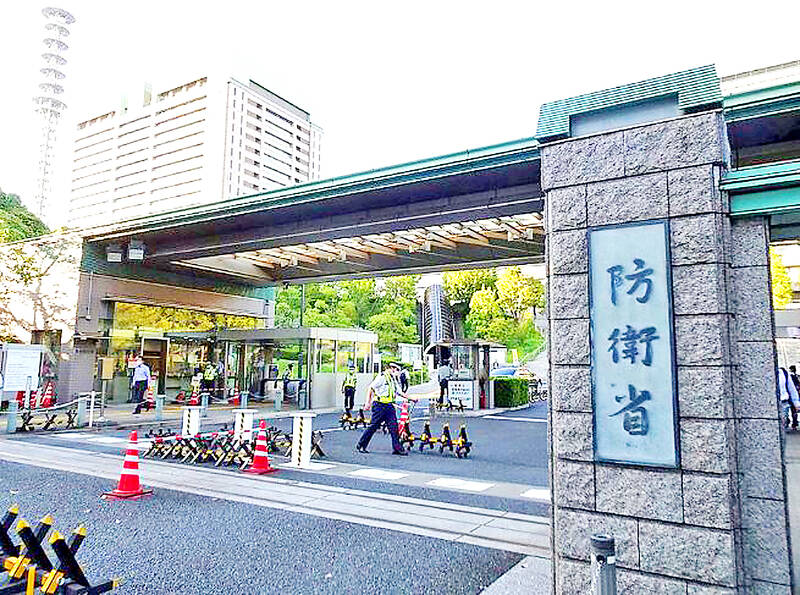Japan has chosen 33 airports and ports as candidates for improvement to enhance military capabilities, with a particular focus on infrastructure that could be utilized in a Taiwan emergency, according to a recent report in Japan’s Nikkei Shimbun.
Citing the Japanese government’s fiscal budget proposal for next year, the newspaper said Toyko is to name some facilities as essential bases and receive funding for upgrades in line with the revamped national security strategy published last year.
According to an unofficial policy document drafted last month and reviewed by the Nikkei, the Japanese government designated 14 airports and 19 ports for improvement, including 16 facilities in the Ryukyu Islands encompassing Okinawa, as well as Kyushu and Shikoku.

Photo: CNA
The selection of the sites suggests a concern with areas near China, a country of surging military capabilities that analysts say could become the focal point of a major conflict in Asia, it said.
New Ishigaki, Miyako and Naha in Okinawa, Kagoshima and Miyazaki in Kyushu, and Kochi in Shikoku are among the airports listed in the government’s plan, the Nikkei said.
These airports could be used as bases for the Japan Self-Defense Forces to deploy troops and supply Taiwan with fuel and food in case of a contingency, the newspaper said.
Yonaguni, New Ishigaki and Miyako airports with their 2,000m-long runways are difficult places to take off or land for heavy military transport aircraft including Japan’s Kawasaki C-2, capable of moving 100 people, it said.
The capability to accommodate heavy cargo planes would enable the evacuation of local residents if necessary, the newspaper said.
Other airports are being considered for runway extensions and installation of a variety of improvements encompassing new parking lots, taxiways and hangars that would allow their utilization by the Japan Self-Defense Forces and Coast Guard, according to the Nikkei.
A civilian runway of 2,500m or more that is easy to use for defense purposes is a security asset for Japan, a senior Japan Self-Defense Force official was quoted as saying.
Japan is eyeing Yonaguni Island for a new port capable of accommodating escort and patrol vessels, while the docks at Ishigaki, Hirara and Naha ports in Okinawa, Kumamoto port and Hakata port in Fukuoka are to be overhauled, Nikkei said.
Facilities in Hokkaido and Fukui prefectures, which respectively have to deal with Russian and North Korean threats, are also to be upgraded, the Nikkei said.
The list of airports and ports to receive improvements is classified and its content is subject to change, it said.
Japan has begun briefing local officials on its plans and ranking members of the government already visited Miyako over the matter of refurbishing Miyako Airport and the Port of Hirara, Nikkei said.

Chinese spouse and influencer Guan Guan’s (關關) residency permit has been revoked for repeatedly posting pro-China videos that threaten national security, the National Immigration Agency confirmed today. Guan Guan has said many controversial statements in her videos posted to Douyin (抖音), including “the red flag will soon be painted all over Taiwan” and “Taiwan is an inseparable part of China,” and expressing hope for expedited reunification. The agency last year received multiple reports alleging that Guan Guan had advocated for armed reunification. After verifying the reports, the agency last month issued a notice requiring her to appear and explain her actions. Guan

GIVE AND TAKE: Blood demand continues to rise each year, while fewer young donors are available due to the nation’s falling birthrate, a doctor said Blood donors can redeem points earned from donations to obtain limited edition Formosan black bear travel mugs, the Kaohsiung Blood Center said yesterday, as it announced a goal of stocking 20,000 units of blood prior to the Lunar New Year. The last month of the lunar year is National Blood Donation Month, when local centers seek to stockpile blood for use during the Lunar New Year holiday. The blood demand in southern Taiwan — including Tainan and Kaohsiung, as well as Chiayi, Pingtung, Penghu and Taitung counties — is about 2,000 units per day, the center said. The donation campaign aims to boost

The Kaohsiung Tourism Bureau audited six hotels in an effort to prevent price gouging ahead of Korean band BTS’ concert tour in the city scheduled for Nov. 19, 21 and 22 this year. The bureau on Friday said that the audits — conducted in response to allegations of unfair pricing posted on social media — found no wrongdoing. These establishments included the local branches of Chateau de Chine, Hotel Nikko, My Humble House, and Grand Hai Lai, it said, adding that the Consumer Protection Commission would have penalized price gougers had the accusations been substantiated. The bureau said the Tourism Development Act

BACK TO WINTER: A strong continental cold air mass would move south on Tuesday next week, bringing colder temperatures to northern and central Taiwan A tropical depression east of the Philippines could soon be upgraded to be the first tropical storm of this year, the Central Weather Administration (CWA) said yesterday, adding that the next cold air mass is forecast to arrive on Monday next week. CWA forecaster Cheng Jie-ren (鄭傑仁) said the first tropical depression of this year is over waters east of the Philippines, about 1,867km southeast of Oluanpi (鵝鑾鼻), and could strengthen into Tropical Storm Nokaen by early today. The system is moving slowly from northwest to north, and is expected to remain east of the Philippines with little chance of affecting Taiwan,